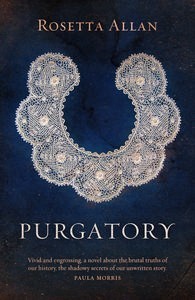Reviewed by Alyson Baker
Ten-year-old John Finnegan can't leave his garden. Ever since they were murdered he, his brothers and his ma have been stuck there, caught between the worlds of the living and the dead. Unseen and unnoticed, he watches the events after his life unfold – including the actions of his murderer.
James Stack is born dirt-poor on an Irish tenant farm and the great famine shadows his childhood. But his clever sister's lace making may save the family – until Aileen is sent to the other side of the world on a convict ship. To save her, James joins the redcoats and follows her across dangerous waters to a hopeful new land. But can he ever leave the death and hunger of his homeland behind?
Based on the 1865 Otahuhu murders, Purgatory is a startling, gripping novel from an immensely talented new author.
What a wonderfully imagined novel, and so well executed. Its focal point is the 1865 Otahuhu Murders, and the times have been meticulously researched, resulting in rich and engrossing story-telling.
The tale is told from two points of view: that of John Finnegan, one of the murder victims after his death, and the other of the murderer, James Stack. John was a young boy when he was murdered and for most of the story he is stuck in his garden along with his Mum and two brothers. Their purgatory is one of total awareness but lacking in touch taste or smell; they are monochromatic and wearing the clothing they wore at their death – so poor John is stuck with one girlish boot on.
John’s predicament is eerily convincing and just as captivating as the detailed story of his murderer.
James Stack is almost an anti-villain – heinous though his actions are, as we read how his life is blighted at every step we find his crime believable, maybe even inevitable. We read James’ story from his childhood during the potato famine in Ireland, through a terrible sea journey on a transport ship to Australia, on to New Zealand where he fights with the British Army in the Land Wars, and finally his path to his ghastly act in Otahuhu.
The range of this historical novel allows tropes such as colonialism in Ireland and New Zealand, the ‘father leaving the mother to cope with a large brood in tough times’, and the desperation to own land so you can feel you actually belong somewhere, to emerge and re-emerge, thus leaving the impression that it is not only the dead who are in purgatory.
The writing is effortless: “What’s heaven like?”, “Ah, like Tyrone I expect, only without the trouble.”; “Still the hat sat strangely, lopped to one side, fitted to the shape of another man’s troubles.”
Purgatory is a great addition to New Zealand historical fiction, and an impressive debut novel..
Alyson Baker is a crime-loving former librarian in Nelson. This review first appeared on her blog, which you can check out here.

No comments:
Post a Comment